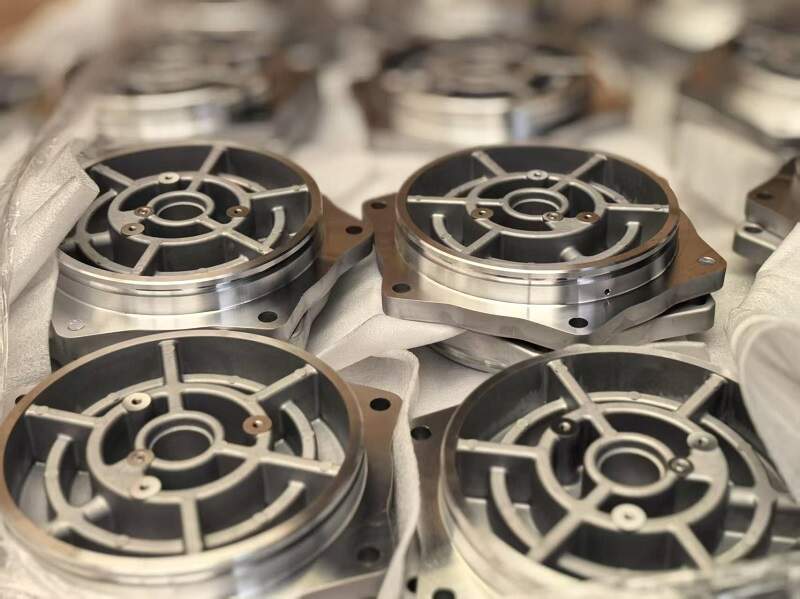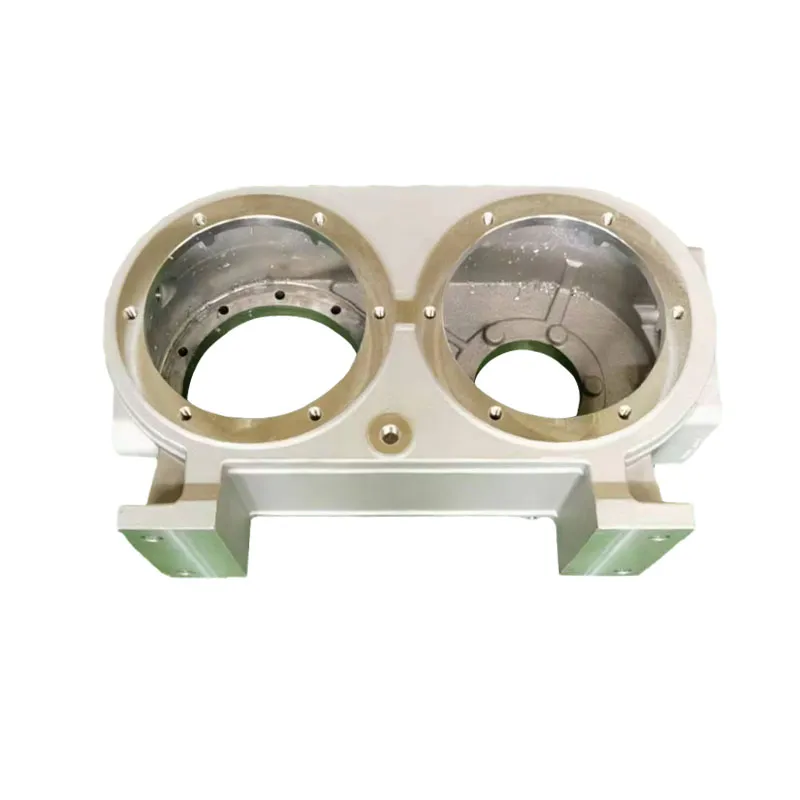What makes an Aluminum Casting Company stand out in today’s market
The Role of Light Weight Aluminum Foundries ahead of time Lightweight Manufacturing Solutions
Light weight aluminum shops greatly add to the evolution of lightweight production options. Their innovative casting technologies yield high-strength, lightweight elements essential for sectors like automobile and aerospace. This advancement not only boosts item performance but likewise advertises sustainability through making use of recycled products. As these foundries adapt to emerging modern technologies and methods, they pave the means for future growths in producing performance and environmental obligation. What exists in advance in this transformative journey?
The Benefits of Lightweight Materials in Manufacturing
As industries significantly look for performance and sustainability, the adoption of light-weight materials in manufacturing has emerged as a necessary strategy - aluminum casting. These products, specifically aluminum and composites, offer many benefits that enhance manufacturing procedures and item efficiency. Mainly, their lowered weight adds to decrease power consumption during transport and procedure, bring about considerable expense financial savings
Lightweight products help with the layout of even more facility geometries, allowing for greater technology in item development. This adaptability frequently leads to boosted functionality and efficiency, accommodating the advancing needs of modern consumers.
Additionally, making use of light-weight materials can boost the longevity of products because of their resistance to rust and tiredness. This toughness not only reduces maintenance prices but additionally sustains sustainability campaigns, as longer-lasting products add to less waste. To sum up, the benefits of light-weight materials are critical in driving effectiveness, development, and environmental duty in production.
Innovations in Aluminum Casting Technologies
Recent improvements in aluminum spreading innovations are reinventing the production landscape, especially in the production of lightweight elements. Advancements such as high-pressure die spreading and vacuum pass away casting have actually substantially enhanced the precision and surface finish of aluminum components - aluminum casting. These methods allow for the creation of intricate geometries while decreasing material waste and improving mechanical residential or commercial properties

Furthermore, the execution of real-time surveillance systems ensures quality control throughout the spreading procedure, resulting in more regular item results. Collectively, these innovations not only enhance the efficiency of aluminum components but also support the industry's shift in the direction of even more lasting production practices.
Applications of Light Weight Aluminum Parts in Various Industries
While light weight aluminum elements have actually long been utilized in different industries, their adaptability and light-weight properties continue to drive innovative applications across industries such as vehicle, aerospace, and building. In the auto market, aluminum is significantly made use of for engine blocks, wheels, and body panels, enhancing gas effectiveness and efficiency. Aerospace manufacturers utilize aluminum for airplane frameworks and parts, profiting from its strength-to-weight proportion to boost gas economic climate and payload capacity.
In the construction market, light weight aluminum is favored for window frames, roofing, and architectural elements, providing toughness and resistance to deterioration while minimizing total structure weight. Furthermore, the electric and electronic devices markets take advantage of aluminum's conductivity and lightweight nature, utilizing it in circuitry, enclosures, and warmth sinks. These varied applications highlight the important function of light weight aluminum elements, which not only satisfy industry needs however likewise add to advancements in item design and functionality throughout multiple fields.
Sustainability and Power Efficiency in Aluminum Foundries
The aluminum shop industry plays an important role in advertising sustainability and energy performance, particularly as need for light-weight elements remains to expand across various sectors. Factories are progressively taking on eco-friendly practices, such as making use of recycled aluminum, which substantially decreases energy usage and greenhouse gas discharges compared to main light weight aluminum production.
Developments in casting innovations boost energy effectiveness by enhancing the melting procedures and reducing waste. Strategies like die spreading and financial investment spreading permit precise product use, decreasing excess and scrap.
Furthermore, numerous factories are spending in renewable resource sources to power operations, better decreasing their carbon impact. Carrying out power administration systems makes it possible for shops to keep an eye on and boost energy usage, guaranteeing they operate at peak effectiveness.

Future Patterns in Lightweight Production Solutions
How will emerging innovations shape the future of light-weight manufacturing remedies? Innovations such as sophisticated products, automation, and additive production are readied to redefine production procedures. The combination of wise production modern technologies, including the Web of Points (IoT) and expert system (AI), will enable real-time surveillance and optimization, enhancing efficiency and lowering waste.

As sustainability proceeds to be a critical problem, light-weight solutions will increasingly focus on reusing and reusing products, lining up with circular economic climate concepts. This development in light-weight manufacturing will not just enhance item efficiency but likewise add to ecological objectives, guaranteeing that the sector continues to be competitive in a rapidly transforming market landscape.
Regularly Asked Concerns
Just How Do Light Weight Aluminum Foundries Make Sure Quality Assurance in Production?
Light weight aluminum shops ensure quality assurance in manufacturing with extensive screening, standard treatments, and continual surveillance - Aluminum Casting Company. They apply competent employees and innovative modern technologies to preserve consistency, reduce flaws, and fulfill sector requirements throughout the manufacturing Home Page process
What Are the Main Tests Faced by Aluminum Foundries?
Light weight aluminum factories deal with obstacles such as changing resources prices, keeping production effectiveness, ensuring consistent high quality, adapting to technological advancements, and meeting environmental guidelines, every one of which influence their total operational performance and competition in the marketplace.
Just How Does Aluminum Recycling Impact Shop Procedures?
Aluminum reusing considerably improves foundry operations by minimizing resources costs, reducing power consumption, and lowering ecological impact. This lasting technique makes it possible for factories to boost efficiency while fulfilling raising demand for lightweight, high-performance aluminum items.
What Skills Are Needed for Workers in Aluminum Foundries?
Workers in aluminum useful link shops need abilities in metallurgy, machining, quality assurance, and safety techniques. Efficiency in running machinery, comprehending alloy residential properties, and problem-solving are likewise necessary for effective production and maintaining high safety criteria.
Just How Do Light Weight Aluminum Foundries Deal With Waste Management?
Light weight aluminum factories manage waste through recycling scrap steel, making use of reliable waste partition techniques, and sticking to environmental laws. They apply lasting techniques to lessen garbage dump payments, making sure that unsafe products are gotten rid of responsibly.
Aluminum factories significantly contribute to the evolution of lightweight manufacturing options. Current developments in aluminum casting innovations are revolutionizing the manufacturing landscape, specifically in the production of light-weight components. While light weight aluminum parts have actually long been used in various markets, their versatility and lightweight properties continue to drive ingenious applications across fields such as auto, aerospace, and their explanation construction. In addition, the electric and electronic devices markets profit from aluminum's conductivity and lightweight nature, using it in wiring, units, and warm sinks. The aluminum factory sector plays an essential duty in advertising sustainability and power effectiveness, especially as demand for lightweight elements proceeds to expand throughout different fields.